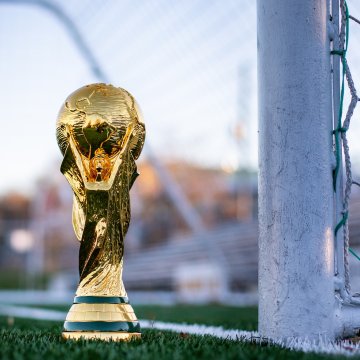- About
- Topics
- Picks
- Audio
- Story
- In-Depth
- Opinion
- News
- Donate
- Signup for our newsletterOur Editors' Best Picks.Send
Read, Debate: Engage.
| topic: | Human Rights |
|---|---|
| located: | Argentina, Qatar |
| editor: | Ellen Nemitz |
The World Cup has returned to Latin America after 20 years. Before Argentina was crowned three-time champion on 18 December, the last time a team from this region won the most wanted football prize was in 2002, when Brazil won it for the fifth time. Beyond the joy, however, football may have some greater meanings than just sport. The 2022 Football World Cup played in Qatar was perhaps the most polemic regarding human rights: from denunciations of grave violations against construction workers during the building of the stadium to the anti-LGBTQ policies in place by the government, these issues seem to have been silenced and forgotten from the first whistle.
The Research Assistant at the Americas Division of Human Rights Watch, Santiago Menna, called it "impressive that Latin American football associations have remained silent about the serious abuses against migrant workers that made this year's World Cup possible." The institution is part of a coalition that has demanded a financial reparation from FIFA and Qatar's government for the migrants harmed since the country was named the event’s host twelve years ago. But none of the six Latin American football associations that qualified - Argentina, Brazil, Costa Rica, Ecuador, Mexico and Uruguay - granted official support to the reparation call. "Maybe they think it's not their problem," he bets. "But given the importance of football to the Latin American population, it is."
The great winner has also been criticised by the Argentinian outlet Clarín for its overall silence and indifference regarding the "controversies over the situation of freedoms essential in the host country" attributed to "a failure of the Memory, Truth and Justice policies." Nonetheless, on 25 March, Lionel Messi and his fellows participated in a campaign for the National Day of Memory for Truth and Justice. At that time, a qualifying match against Venezuela was scheduled for the special day in order to facilitate the organisation of marches in memory of the people who disappeared during the last dictatorship (which lasted from 1976 to 1983), reaffirming and deepening "the commitment between sport and human rights."
The polemics involving human rights and football goes back much further in time, however. The absence of black players as a result of racism over the centuries has been noticed by activists. Two centuries ago, nearly one third of the Argentine population was black, but an intentional whitening process made it the most white country in Latin America and suppressed the awareness about its black ancestrality, as explained by HistoryVille.
Moreover, in 1978, when the World Cup was held in Argentina and the team won the championship for the second time, the country was under a violent and cruel dictatorship and the sports event became an advertising tool for the military regime - a story told by the the documentary "Memories of Lead: Football in the Time of the Condor."
More than four decades later, while there is no dictatorship and Argentina lives under democracy, football maintains its strong power of covering-up human rights abuses. Although celebrating the joy of such a victory is a fair right of Argentina and Latin American people, forgetting those who have perished is not. May football, from now on, be a way of spreading the universality of human rights, and not suppressing them
Image by History of Soccer.

